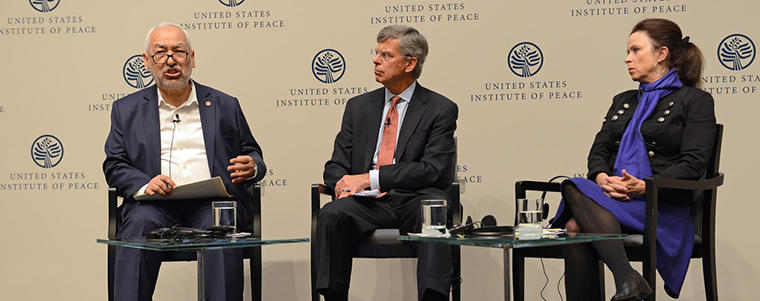Sheikh Rachid Ghannouchi, the founder of Tunisia’s Islamist party, appealed this week for U.S. political and economic support as his country struggles to complete its historic transition. Tunisia, the lone success story out of the Arab uprisings, could serve as an example for Iraq, Syria, Egypt and others, he said.

Ghannouchi, founder and president of Tunisia’s Ennahda Party, said his country’s success is also vital in proving that moderate Islam can co-exist with democracy -- and countering claims about links between Islam and terrorism. Democracy, he said, can actually be another way to fight terrorism.
“We cannot fight terrorism without spreading democracy in the world,” Ghannouchi told reporters at the U.S. Institute of Peace on Sept. 29, prior to a public discussion of Islam, democracy and extremism. He noted that his party relinquished power during political tensions last year to forestall a spiral into violence, as has happened in other Arab countries. The political implosion in neighboring Libya since the overthrow of Colonel Moammar Gadhafi has particularly had a rippling impact on tiny Tunisia.
Ghannouchi said the flawed transitions elsewhere—including the military ouster of Islamist President Mohammed Morsi in Egypt, the disintegration of Syrian protests into civil war, and the exclusion of Sunnis in predominantly Shiite Iraq--contributed to the rise of the “Islamic State” militant group.
“There are many failed experiences in the region,” said Ghannouchi, who had also spoken at USIP in February. But he cautioned against writing off the prospect of democratic values in the Middle East and North Africa. “We think democratic Islam can be an alternative to terrorism.”
Ghannouchi cited Tunisia’s new constitution, adopted by parliament earlier this year, as proof that Islam and democracy are compatible. It has been hailed as one of the most progressive in the Arab world. The constitution marks “the first time in the Arab world that [human] rights have been accepted and the place of women has been strengthened,” he said. Among 62 women in parliament, two-thirds are Islamists.
One of those women, Amel Azzouz, a lawmaker and member of Ennahda’s political bureau, accompanied Ghannouchi during his Washington meetings. She noted that Tunisia’s 2011 revolution began at least partly over the high rate of unemployment. Economic assistance would indicate the U.S. is interested in “investing in democracy,” she said.
Tunisia was the first country during the “Arab Spring” to oust its autocratic leader, President Zine El Abidine Ben Ali. Ghannouchi’s moderate Islamist party, Ennahda, won the largest share in multi-party elections later that year and led Tunisia’s first democratic government in a three-party coalition. But the assassinations of two leading opposition figures last year prompted renewed protests and accusations that Ennahda tolerated violent extremism.
In 2013, the party gave up power in favor of a caretaker government until elections this year. Now, Ennahda is one of several parties in Tunisia that will be contesting parliamentary elections on Oct. 26. But it has said it won’t field a candidate in the presidential election in November to avoid appearing to control all branches of government.
“Domination is very dangerous,” Ghannouchi told reporters. In a nascent democracy, too much success for any one group can lead to political polarization. The integrity of the democratic process was more important than short-term benefits and would ensure that Ennahda could survive to potentially win another day. “So we controlled ourselves,” he said.
Still, he wouldn’t say whether Ennahda would back a candidate in the second round of the presidential election. “Sometimes being kingmaker is not less important than being king.”
The broader region of the Middle East and North Africa now stands at a crossroads, Ghannouchi told the audience in the public event, between “democracy, development and progress” on the one hand and “the spread of chaos, terrorism, civil wars and sectarianism” on the other.
“The question now is why did the map of the Middle East change so fast from a promising democratic movement to hot spots of conflict and tensions?” he said. “Is the cause of that the rise of Islamists to power, and their failure to govern and to build stable, democratic systems?”
To the contrary, he said. “Democracy is possible in the Middle East as long as its [required] conditions are present,” Ghannouchi said. “There is no Arab exception. There is no contradiction between Islam and democracy, and dictatorship is not necessarily a destiny.”